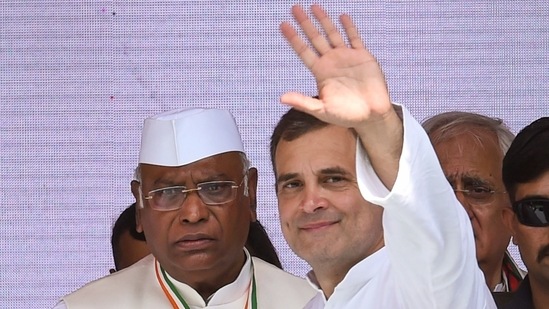Congress must address the elephant in the room
Kharge may be at the helm, but Rahul Gandhi’s role — of wielding power without responsibility — must be acknowledged. This will help bring in structural changes that can revive its fortunes
The much-hyped Congress presidential election could be likened to a school prefect contest, where, irrespective of the number of candidates in the fray, the principal’s choice almost always wins. The moment party veteran Mallikarjun Kharge was perceived as the “unofficial-official” choice of the party’s high command, there was always going to be only one winner. Shashi Tharoor, with his stylish bandhgalas, signature hair flip, and clipped English accent, was the odd man out, an intellectual attempting to break into the Congress’s inner circle. A small consolation for him is that he wasn’t totally wiped out like Jitendra Prasad was when he contested against Sonia Gandhi two decades ago.

The media-savvy Tharoor positioned himself as the candidate of change, a three-time Lok Sabha Member of Parliament (MP) who promised to do away with the Congress’s ubiquitous high-command culture. The octogenarian Kharge, on the other hand, is a long-time loyalist — a term often synonymous with old-style political sycophancy. It is almost axiomatic to see the Karnataka leader as a rubber stamp president, someone who will faithfully adhere to instructions from the Gandhis. The loyalist tag suggests that Kharge, despite being a nine-time Member of Legislative Assembly (MLA) with an impressive track record of never having lost an assembly election, cannot become a parallel power centre. It is no surprise, then, that Kharge was the apparent choice of the Delhi durbar, or those who derive their clout from their proximity to the Gandhi family.
It is this durbari coterie of rootless politicians lacking any mass connect who have been willing accomplices in the decline of the party from a mass organisation to a tightly controlled quasi-family firm. In the Sonia Gandhi years, several key Congress functionaries were Rajya Sabha MPs, commanding authority disproportionate to their vote-catching ability. Which is also why the so-called rebellion against the Gandhis quickly fizzled out. None of the stalwarts calling for a rethink in the party’s decision-making apparatus could eventually walk the talk because they were prime beneficiaries of the dulled status quo that has pushed the party to the brink.
Previous splits occurred because they were engineered by leaders of substance — be it a Devaraj Urs or a Sharad Pawar — who could at least call the shots on their home turf, or because a leader such as VP Singh became a magnet for transformation. Now, there are no such agents of change left within the party.
Paradoxically, the one potential revolutionary within the Congress is Rahul Gandhi, who has steadfastly rejected all pleas to return to the post he resigned from after the 2019 electoral debacle. Gandhi’s leadership style is justifiably criticised for being highly erratic at times — recall the reckless manner in which he tore up his own government’s ordinance in 2013, or the infamous hug and wink 2018 episode with Prime Minister (PM) Narendra Modi in Parliament — but the one issue on which he has been consistent is his professed desire to democratise the Congress. Some of his ideas are fanciful — for example, holding United States-style primaries to decide on election candidates — but he appears the most willing Congress leader to shed past baggage and push for internal reform. This might explain why he stayed away from interfering with the presidential elections, preferring to focus instead on the ambitious Bharat Jodo Yatra.
But can Rahul Gandhi translate his revolutionary intent into a robust plan of action? This is where the Congress needs to realise that a presidential election with a predictable outcome, or indeed, a march from Kanyakumari to Kashmir, however well-intentioned, isn’t enough to transform the party’s fortunes. Viral videos from the yatra will give Congress supporters reason to cheer, but elections are not won through digital media click-bait, but away from the media glare through the arduous task of a complete organisational refit. A non-Gandhi at the helm is a cosmetic change unless it is backed by a genuine attempt to decentralise and empower the local leadership. The Congress desperately needs a setup where political authority cannot be concentrated around a largely inaccessible family-centric party boardroom.
In a sense, as a fifth-generation dynast, Rahul Gandhi remains the Congress’s elephant in the room. As the yatra has revealed, he is the Congress’s most popular leader within the rank and file by some distance, a party mascot who embodies ideological conviction and anti-Bharatiya Janata Party resistance. But his undefined role of wielding power without responsibility ensures that the party is in no position to break the umbilical cord with a leadership structure that is rooted in feudal loyalties.
Which is why the challenge for Rahul Gandhi is to use his unique position of power and influence within the Congress to initiate a process of structural and generational change that may make or break the grand old party. A battle-weary Kharge as president is at best a stop-gap arrangement, but not the long-term answer to the Congress’s existential crisis. Eventually, it is for Rahul Gandhi to decide: Is he the de facto leader of a party frozen in time or is he a radical political activist, someone willing to risk his privileged position to build anew with fresh talents and energies?
Post-script: Kharge may not enthuse “new India”, but his story is no less compelling than that of PM Modi. Son of a mill worker, from a Dalit family, he is a self-made politician who first rose as a labour union leader in Gulbarga. As he told me in an interview, “I am not a naamdar (elite), but a kaamdar (hard worker).”
Rajdeep Sardesai is senior journalist and author
The views expressed are personal
Continue reading with HT Premium Subscription





